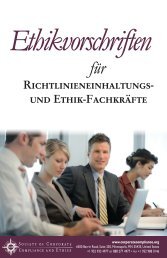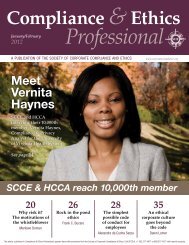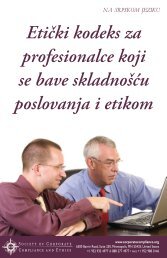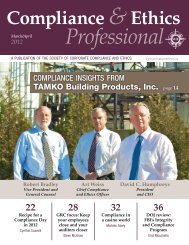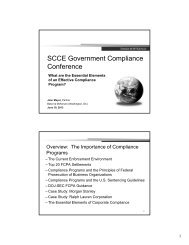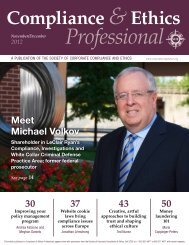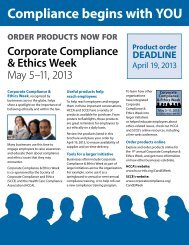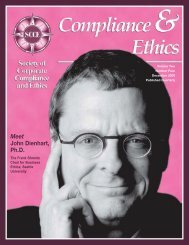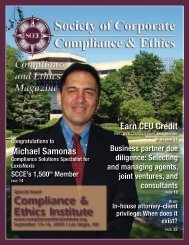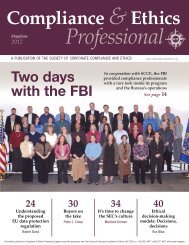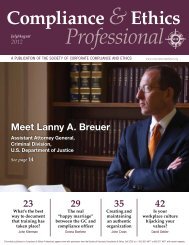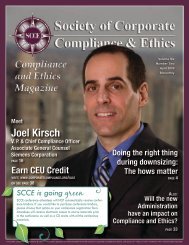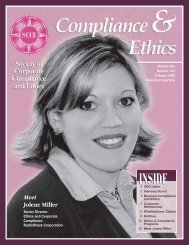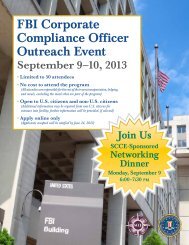Compliance &Ethics - Society of Corporate Compliance and Ethics
Compliance &Ethics - Society of Corporate Compliance and Ethics
Compliance &Ethics - Society of Corporate Compliance and Ethics
- No tags were found...
Create successful ePaper yourself
Turn your PDF publications into a flip-book with our unique Google optimized e-Paper software.
groups. If they are being done “internally” itis best to bring in a colleague from anotherdepartment, division, or location to increasethe emotional distance between interviewer<strong>and</strong> interviewee. Interviews <strong>and</strong> focus groupsare less likely to yield the needed information<strong>and</strong>/or insights if the interviewer is believedto have any vested interests <strong>and</strong>/or personalrelationship with the “client.”And, as in all interviews, follow-up tosome responses may be appropriate. My favoritefollow-up probe is: “What else can you tellme about that?” I have been known to “whatelse” a subject two or three times regarding asingle question, if the subject matter warrants.The question is neutral <strong>and</strong> non-threatening,if asked “flatly” without any judgment implied.Typically, I use the same set <strong>of</strong> questionsin interviews <strong>and</strong> focus groups. The differenceis that interviews are usually preferredfor higher-level individuals <strong>and</strong> others wherethere is a degree <strong>of</strong> “uniqueness” about theirpositions. Focus groups are better suited forlevels/functions that have numerous “incumbents”from which a representative sample canbe pulled.Questions for a management/executiveinterviewee might include variations on thefollowing.1. Ice breaker··Introductions; identify roles <strong>of</strong> consultants··Explain the purpose <strong>of</strong> the interview··Explore the prior experiences <strong>of</strong> the interviewee.How did he/she get to his/herpresent position?··Identify the current roles <strong>and</strong> responsibilities<strong>of</strong> the interviewee··Informal “chit-chat” if appropriate to buildrapport2. Culture··Identify the written st<strong>and</strong>ards <strong>of</strong> behavior.Do they reflect reality?··Identify any unwritten st<strong>and</strong>ards. Do theyreflect reality?··Why do employees come to this company?Why do they stay? Why do they leave?··How has the company changed in the past5 years?3. Strategy··Is there a formal strategy?··Is the strategy written or published?··What was the process for developing theexisting strategy?··Did the interviewee have a role in shapingthat strategy?··What external forces influenced the companyto adopt the current strategy?··Other than financial performance, whatconstitutes “strategic success”?4. Leadership··How would you characterize the CEO’sleadership/management style?··Is the CEO’s style representative <strong>of</strong> seniormanagement’s leadership/managementstyle?··Who are the key decision-makers?5. Decision-making··What types <strong>of</strong> decisions do front-lineemployees make?··Do decision-makers have the appropriatelevel <strong>of</strong> responsibility, authority, experience<strong>and</strong> training to make the requireddecisions?··How does the company resolve dilemmas?··What happens to employees who makeincorrect decisions?6. Employees··Why do most employees come here to work?··Why do they stay?··Why do they leave?··What constitutes success from the employees’point <strong>of</strong> view?<strong>Compliance</strong> & <strong>Ethics</strong> Pr<strong>of</strong>essional May/June 2013+1 952 933 4977 or 888 277 4977 www.corporatecompliance.org 57



